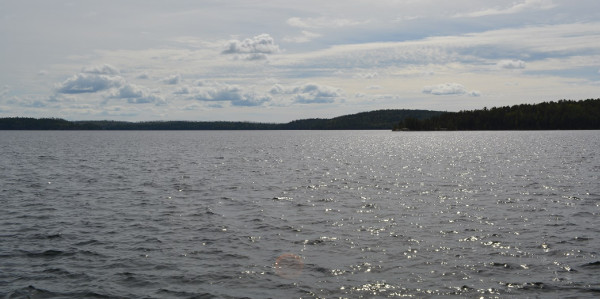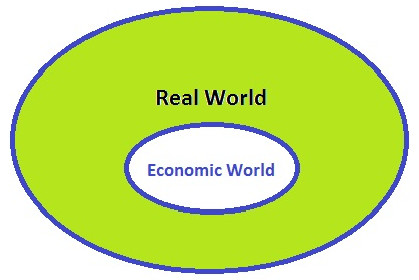Stephen Harper's this ideological war is part of a larger worldview, one that seeks to remove everything but economic interests from his version of reality.
By Ted Mitchell
Published November 11, 2013
The Experimental Lakes Area (ELA) is located in northwestern Ontario, halfway between Kenora and my hometown of Dryden. It was established in 1968 to study freshwater pollution, a science called limnology.

Winnange Lake Provincial Park near the Experimental Lakes Area
The ELA has been in the news for the last two years, owing to the Conservative Harper Government's placing it on the chopping block to save an estimated $2 million annual operating cost. This has been derided by the scientific community.
There have been widespread efforts to save it by both grassroots and political forces, initially to no avail. Even Rick Mercer weighed in on the issue.
Last year, the Federal government began dismantling equipment until opponents noticed and the negative publicity halted the practice. On March 31, 2013, time ran out on the area and its long-term scientific experiments were placed in limbo.
The area comprises 58 small lakes that are off-limits to the public, making them the perfect petri dish for full-scale biologic experiments. Scientists can control one variable, such as the level of a pollutant, and measure the impact on aquatic life in that lake.
The ELA was instrumental in identifying the problem of acid rain and spurred an effective global response. Its scientists were the first to alert the world to the effect of phosphate detergents creating toxic algal blooms. Many experiments are currently in progress, from nanosilver contamination to climate change research.
ELA represents Canada positively to the world, contributing unique and essential research applicable to the entire planet. You can’t buy this kind of diplomacy. No other country in the world has isolated lakes at temperate latitude, so these experiments are as important globally as they are to Canada.

A membrane separates normal and phosphate-enriched water in the ELA (Image Credit: Save ELA)
ELA's operating budget includes the employment of many scientists and student assistants for $2 million a year. That figure works out to 6 cents per Canadian, or less than 10 percent of what the Conservative government spent on advertisements last year for its “Economic Action Plan”.
There was significant backlash over the decision to close ELA, and even local Conservatives were unimpressed. Anyone with a smidgen of political sense would realize that the optics of this cancellation are terrible. Even if ELA scientists did nothing but fish and drink beer, global recognition for Canada is worth far more than buying airspace for Economic Action Plan ads.
Despite the local reaction, Conservative backbench MP Greg Rickford supported Harper on this issue. He must know, being the first Conservative ever elected to this seat, that his re-election chances will suffer because of his loyalty.
After the government passed the bill to close the ELA, Rickford was been appointed Minister of Science and Technology.
In September 2013, after much rumour, an agreement between the governments of Ontario and Manitoba rescued the area. Manitoba's interest owes to the fact that most ELA scientists work at the University of Manitoba.
But provinces and universities are not the logical stewards or bank-rollers of the ELA. This is a nationally and internationally significant area which should be funded and operated as such. Closing it deprives Canada and the world of critically important, and economically efficient research.
All the drama around ELA was unnecessary. Why would Stephen Harper do such a politically foolish thing to save us a few pennies, and not give in to the criticism?
It could be simple political posturing. Even if you're wrong, never back down as that would be a sign of weakness.
Or maybe it is an ideological war on basic science, especially anything environmentally related. This has been suggested by many, including a journalist named Chris Turner.
The upcoming November 27 Spirit of Red Hill lecture is being presented by Turner, which he calls “The War on Science”.
Turner was recently interviewed on CBC along with a Conservative critic who was quick to point out that the government is spending more than ever on research. Whether this is true in inflation-adjusted dollars is questionable, but there has been a clear shift away from funding basic science under Harper's watch.
Money now flows to applied science, especially those things that directly promote the Harper Government's economic interests, such as oilsands and pipelines, excluding the study of harmful effects of same.
More concerning than the shift in funding is controlling the message. Without any Canadian precedent, our government has sent public relations staff to scientific conferences to ensure the scientists don't say anything undesirable. I will leave Mr. Turner to elaborate on this topic.

Portage near Winnange Lake
I argue that this ideological war is part of a larger worldview, one that seeks to remove everything but economic interests from Harper's version of reality. To demonstrate this we need a Venn diagram.

Venn diagram: Real world and economic world
If you think about it, economic reality is entirely contained within the larger real world. But it is inadequate to apply economic rules to everything.
Einstein's Razor applies here: things should be made as simple as possible, but no simpler. It is too simple to use only the rules of economics to run a country and expect it to flourish in the long term.
Humans have created the economic world by placing an arbitrary value on things, relative to the effort needed to achieve it or the scarcity of a product against demand for it.
I have a problem with this model because it does not count costs. It is an unbalanced equation, and by dismissing inconvenient facts you are missing the truth.
These uncounted costs, or externalities, go unpaid by those who generate them. They are nonetheless paid for by others. They extract a toll on human life, quality of life, and negative effects on the whole biosphere in ways that cannot be replaced by a dollar value.
Ironically, people of mediocre intellect but boundless self-confidence (think of that large mayor north of us) like to use the phrase 'real world' for what I've defined as the smaller economic world. As in, “wait until you get into the real world, then you'll see...”. Beware of this, they do not and will never understand the error.
On a long enough time scale, human civilization is doomed if we pretend reality is simple enough to conform to economic rules and ignore the rest.
Some of the most powerful corporations and politicians today would have you believe that the economic world is all that matters. If you are a conservative, I'm talking to you. The economy is important, but anyone who would reduce the real world to dollars and cents is sociopathic.
It's the real world that matters to people, regardless of political affiliation. It's in the real world that love, life, respect, clean air and water and healthy grandchildren happen.
These are not things that you can buy with any amount of money, but they certainly are things that can be threatened by a mad focus on redefining the economy as all-important.

Winnange Lake campsite
By viennacafe (registered) | Posted November 11, 2013 at 20:33:47
The lack of a basic understanding of the scientific method and outright hostility to science and scientific evidence, particularly by political and economic interests and governments, is shocking and disturbing and, IMHO, is indicative of an emerging dark period in human history. Ironically, in an era of an unprecedented access to knowledge and information, ignorance has become currency.
By Noted (anonymous) | Posted November 11, 2013 at 22:24:47 in reply to Comment 94658
http://www.bostonglobe.com/ideas/2013/10/20/math-only-agree-with/dNXiuubRILEUqtQ8IzUqEP/story.html
By j.servus (registered) | Posted November 11, 2013 at 23:32:54
Thanks for the excellent article. You are eloquent about the most important point: no price can be assigned to a clean conscience, fidelity to intelligence, to reason, to responsibility.
Your article also brings to light the underlying reason why it was a tragic mistake for the US Supreme Court to rule that corporations are 'persons' for the purpose of campaign contributions. Real persons have many different concerns and interests; corporations only have one: creating value for shareholders. (At least, this is the way business is currently taught.)
Without wishing to detract at all from the importance of the issues you raise, I would suggest a nuance at one point. I don't think 'arbitrary' is the right word for the values assigned by markets, inasmuch as 'arbitrary' connotes 'irrational', as in just picking a number at random. Prices do reflect some (inadequate) rational valuation. However, as you point out, the prices assigned do not reflect all the real costs, because (among other reasons) they do not (adequately) take into consideration externalities. Prices count costs, but not all the real costs. A regulatory framework like, for instance, a carbon trading scheme, is an attempt to assign a price to negative externalities that otherwise are not adequately accounted for simply by correlating supply and demand. In other words, this kind of regulation assigns an economic cost for what has a real cost. It is not clear to me how else these costs could be properly accounted for, since an individual vendor or consumer is not in a good position to understand, evaluate, and responsibly assign a dollar value to something like "air quality for everyone," in relation to some prospective purchase. (Of course there are always some who will by "carbon offsets," but the exceptions prove the rule: the externalities aren't accounted for in the price, and we know it.)
All of that said, I would not want to be misunderstood. My first point is that prices are a rational valuation system. My second point is (as you eloquently explain) that there are real costs that are not adequately accounted for in that system. My third and most important point is also your main point, as I take it: There are values to which no economic cost can possibly be assigned, and among them are the most important values in the world. As I tell my children, how much money is a clean conscience worth?
Comment edited by j.servus on 2013-11-11 23:38:58
By viennacafe (registered) | Posted November 11, 2013 at 23:56:20 in reply to Comment 94661
“shocking and really disturbing.”
Indeed.
By brinntache (registered) | Posted November 12, 2013 at 13:47:49
Hi. I spent a summer working at ELA as an assistant tech. One of the biggest uses for ELA was to test the toxicity of various new fertilizers and chemicals before they could be brought to market. (it would shock you to know how low the bar was). No ELA means no real world testing of chemicals to find out if they wipe out entire species. Or worse, don't break down and stay in our drinking water. So, the Harper Conservatives close ELA, and big Agriculture and big Chemical are happy. Guess which party has the largest financial donations? This decision is just not about pure science vs applied science.
By Ted Mitchell (registered) | Posted November 14, 2013 at 13:44:59 in reply to Comment 94676
Good to know they are doing applied science also, I've nothing against this. It is a problem that we don't know exactly what they're up to, although too much knowledge could lead to overboard environmentalist opposition. Lack of transparency is a problem everywhere.
By SCRAP (anonymous) | Posted November 16, 2013 at 21:38:00
Well Dr, it is nice to know that there is at least one who is at your level actually talking and writing about this. It is refreshing.
We all know that the air, water and land is poisoned, how much, that is the truth that is missing. I wish we could live in a natural world, however, given the capitalist nightmare that is so entrenched in our lives, may never be defeated.
I tend to think that people tend to follow orders, opposed to the princples of the Nuremberg trials, where insane orders are not to be followed. It o ny takes one person to started that, right, if one falls, then others will jump on the bandwagon, at least this is what we would hope would happen.
The economy, what is that exactly, as I am not sure, given my accounting background, which never led me out of poverty. I was flabberghasted at Dr Lewchuck's words at the Precarious Employment Forum, where instead of getting rid of temp work, certain of the usual suspects in this city want ot humanize it, which does nothing to lead people out of poverty.
I wonder, why is ti that all those highly skilled medical professionals who work in the hospitals do not really care about the food that is being served, since whole food is imperative to good health. Everyone seems to just keep their heads down, instead of fighting for what is right and just. Something wrong there.
I could go on and on, I think you get the gist of it, at least I hope you do.
OUr poltiical system is broken, why do so many not see that or get involved to change it?
By missy 2013 (anonymous) | Posted November 23, 2013 at 02:45:43
A billion dollars has just built a new spy 'palace' for Stephen Harper's government in Canada. http://www.cbc.ca/m/touch/politics/story/1.1930322
It's sickening to think what could have been accomplished if even one tenth of that sum had gone towards the good work of the ELA.
You must be logged in to comment.
There are no upcoming events right now.
Why not post one?